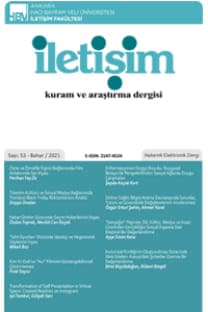What is 'Empowering' and who the 'Users' are in the new media
Yeni medyada "Kullanıcının Gücü"
___
- Bakhtin, M. M. (1981). ‘Discourse in the Novel,’ in M. Holquist (ed) The dialogic imagination: four essays. Austin: University of Texas Press, pp. 259-422.
- Boyd-Barrett, O. (1998). ‘Media imperialism reformulated,’ in Electronic Empires: Global Media and Local Resistance. London: Arnold, pp. 157-176.
- Dahlgren, P. (2007). ‘Civic Identity and Net Activism: The Frame of Radical Democracy,’ in L. Dahlgren and E. Siapera (eds.) Radical Democracy and the Internet. New York: Palgrave Macmillan, pp. 55-72.
- Dyer-Witheford, N. (2007). ‘Hegemony or Multitude? Two Versions of Radical Democracy for the Net,’ in L. Dahlgren and E. Siapera (eds.) Radical Democracy and the Internet. New York: Palgrave Macmillan, pp. 191-206.
- Ericson, R. et al. (1987). Visualizing Deviance: A Study of News Organization. Toronto: University of Toronto Press.
- Fiske, J. (1988). Television Culture. London: Routledge.
- Fiske, J. (1989). ‘Popular Television and Commercial Culture: Beyond Political Economy,’ in G. Burns and R. Thompson (eds.) Television Studies: Textual Analysis. New York: Praeger, pp. 27-30.
- Flew T. and S. McElhinney (2007). ‘Globalization and the Structure of New Media Industries,’ in L. A. Lievrouw and S. Livingstone (eds). The Handbook of New Media. London: Sage, pp. 287-306.
- Freire, P. (1996). Pedagogy of the Oppressed. London: Penguin.
- Goldsmith, J. and T. Wu (2006). Who Controls the Internet? Illusion of a Borderless World. New York: Oxford University Press.
- Hall, S.(1982). ‘The rediscovery of ideology: return of the repressed in media studies,’ in M. Gurevitch, et al. (eds.) Culture Society and the media. London: Methuen, pp. 56-90.
- Jenkins, H. And D. Thorburn (2004). ‘Introduction,’ in H. Jenkins and D. Thorburn (eds.) Democracy and New Media. Massachusetts: MIT Press, pp. 1-17.
- Lemon, S. (2002). ‘Yahoo Criticized for Curtailing Freedom Online’ at http://www.pcworld.com/article/103865/yahoo_criticized_for_curtailing_free dom_online.html (accessed 10 Jan 09).
- Mattelart, A. and M. Mattelart (1999). Theories of Communication. London: Sage.
- Mattelart, A. (2003). The Information Society. London: Sage.
- McChesney, R.W. (2000). Rich Media, Poor Democracy. New York: New Press.
- McLuhan, M. (2001). Understanding Media. London: Routledge.
- McQuail, D. (1992), Media Performance. Mass Communication and the Public Interest, London: Sage.
- Mouffe, C. (2000), The Democratic Paradox, London: Verso.
- Morley, D. (2006). ‘Unanswered Questions in Audience Research’. The Communication Review, 9:2, 101-121.
- Negroponte, N. (1995). Being Digital. New York: Vintage.
- Rantanen, T. (2005). The Media and Globalization. London: Sage.
- Rushkoff, D. (2003). Open Source Democracy. London: Demos.
- Schuler, D. (2000). ‘Reports of the Close Relationship between Democracy and the Internet May Have Been Exaggerated,’ in H. Jenkins and D. Thorburn (eds.) Democracy and New Media. Massachusetts: MIT Press, pp. 69-84.
- Poster, M. (2007). ‘Culture and New Media: A Historical View,’ in L. A. Lievrouw and S. Livingstone (eds). The Handbook of New Media. London: Sage, pp. 134-.140
- Yayın Aralığı: 3
- Başlangıç: 1983
- Yayıncı: Ankara Hacı Bayram Veli Üniversitesi İletişim Fakültesi
Haber söyleminde medya- siyaset ilişkisi: 29 Mart 2009 yerel seçimleri
Siyasetçi-medya ilişkileri bağlamında bir inceleme: "Deniz Feneri örneği"
Gülcan IŞIK, Ülkü Ayşe BÖREKCİ OĞUZHAN
İletişim bilimini Rousseau'dan okumak: 'kötü' yanlarımızın sonucu mu, 'iyi' yanlarımızın katkısı mı?
Erken Cumhuriyet dönemi dergi ve gazetelerinde spor ve kadın (1928-1960)
Funda CANTEK ŞENOL, Betül YARAR
Halkla ilişkiler çalışmalarının dünü, bugünü ve geleceğine ilişkin bir değerlendirme
Toplumların idaresinde liderler ve yöneticiler
Basın işletmelerinin finansman sorunları ve bir finansal analiz uygulaması
1980'lerden 2000'lere Türk sinemasında ürün yerleştirme uygulamalarında görülen nicel değişim
Cinsellik üzerinden "tık ticareti": İnternet haberciliği üzerine bir inceleme
What is 'Empowering' and who the 'Users' are in the new media
